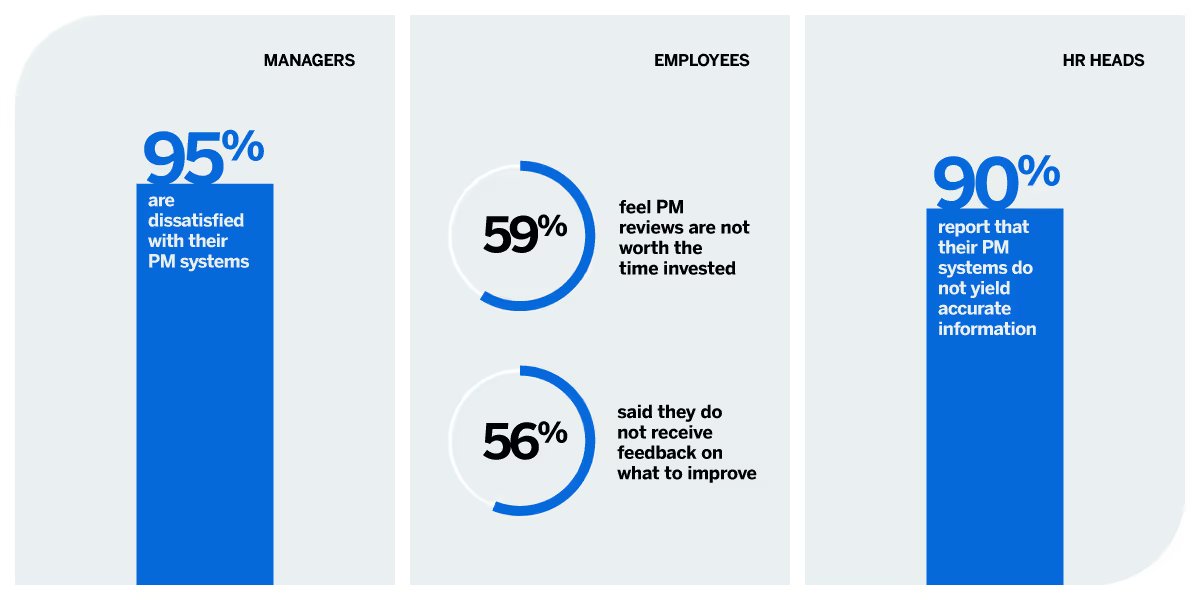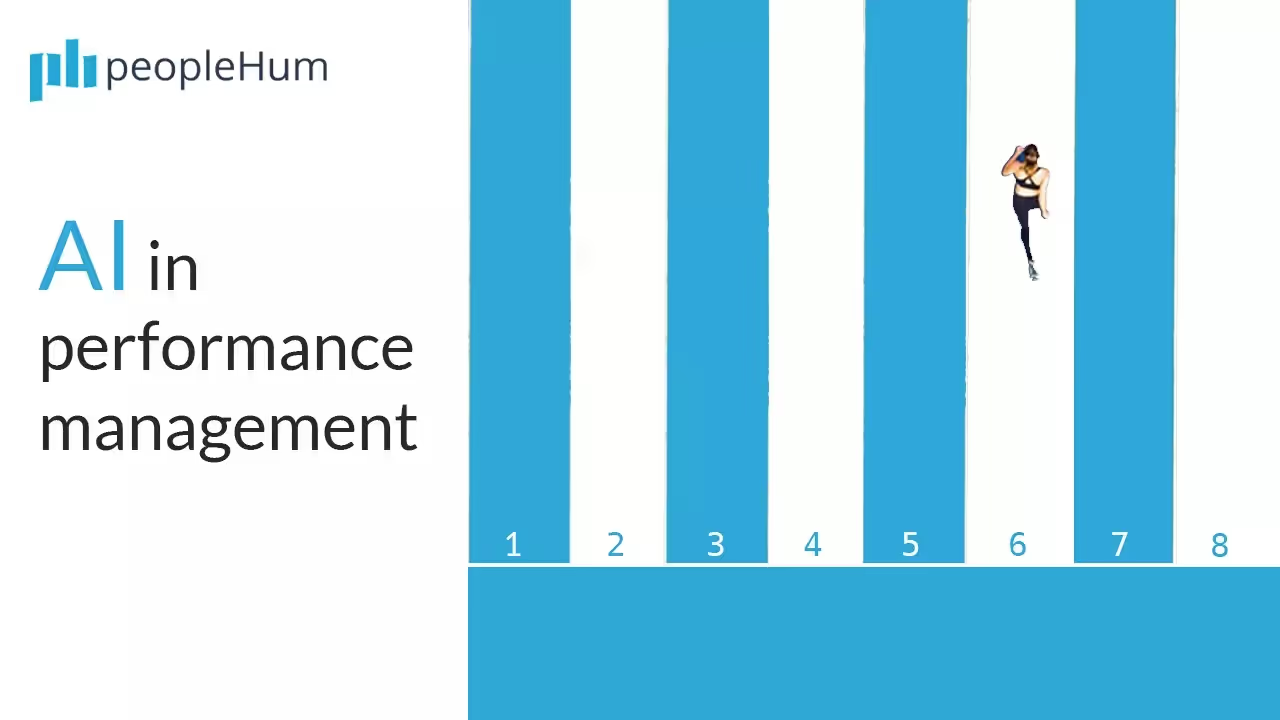Business leaders see a lot of potential in the performance management trends with AI and what it can bring to the future of their companies. For example, freeing employees from redundant tasks so they can do more productive work, and hire people into jobs that are right for them. It gives a sense of freedom and liberation to focus on tasks that add value.
They can, in fact, measure the results through an AI-driven performance management software. As we move forward with AI in performance management, we look at ways in which it can transform business processes.
People are becoming more and more technology savvy. Teams are now choosing a performance management system that can automate repetitive tasks. Moreover, views and feedback evolve with time and with respective employee performance.
So, machines can help keep a good track of it and provide the required assessment for improvement. Let's look into the benefits of the role of AI in performance management right here.
Also read : 5 elements of an effective performance management software
Role of AI in Performance Management: How is it used?
1. Automated performance reviews
Business leaders love Ai-driven performance management. It helps them as well as team leaders to focus on factual information and carry out employee performance reviews. There is a need for employees to collaborate and make decisions. We are now better off to measure results from such collaborations using AI software in performance management.
The ROI of performance management system is pretty much connected to the presence of artificial intelligence in performance management system. We can see 3 major benefits with this:
a. Seamless collection of information
Otherwise, employees have to run around on different office floors and look for the information they need. It is alright if there is ample time for taking certain decisions but what about the ones that need immediate action or approval? Therefore, the role of AI in performance management system is going to ensure that all the information is stored in one single place. This information or employee data can help leaders and stakeholders evaluate employee performance and share it with other team members as well.
b. The manager can easily extract insights from real-time analysis
This is because the real-time analysis is important to keep a regular check on performance. Nobody needs outdated data or information. Nobody would benefit from that either. Therefore, correct data comes with real-time analysis and it helps improve overall employee performance.
c. It eliminates any form of psychological bias
In fact, it is one of the most crucial reasons why AI in performance management system is going to takeover performance evaluation and employee assessment.
2. Continuous real-time assessments
Modern and agile performance management guides are helpful in conducting regular feedback sessions. AI in performance management systems can reduce the necessity and burden of rigid performance evaluation cycles. Therefore, it brings more flexibility and relevant insights with the help of performance ai.
It will accelerate and ensure timely feedback. This is important because irregular feedback may impact the overall employee performance. So, timely feedback can immediately highlight areas of improvement and boost business productivity.
3. Learning and Development
AI can easily determine the areas of improvement for various employees. It can inform the manager if an employee is lacking somewhere and how they can improve.
AI can help employees reinvest their skills much before they become obsolete. Therefore, AI won't take away jobs but help employees stay relevant and improve their skills. This is going to take away the terror of people becoming redundant because they won't. Interpersonal skills and mathematical intelligence are always going to stay relevant.
4. Removes bias
AI can remove some of the human biases that may be present in traditional performance evaluations, providing a more objective assessment of employee performance. Automated performance evaluations can save significant time and resources for HR professionals and managers, as the software can handle much of the administrative work associated with the performance evaluation process. But in many cases, it is actually a subconscious behavior, similar to the mistakes managers make during 1-on-1 meetings.
So, artificial intelligence in performance management system can help people neglect these areas of bias and ensure equality. AI doesn't believe in building prejudices according to age, race, gender, ethnicity, nationality, etc, and provides an equal opportunity to all with the help of performance ai.
It is in human nature to get diverted from time to time and machines are trained to follow a direct path. So, artificial intelligence and machine learning can create an unbiased work environment so that everyone gets an equal opportunity to seek pay raise or a promotion.
5. Easy internal communication and query resolution
Miscommunication at work is common and thus smooth communication practices are essential in every workplace. AI can automate repetitive responses so that employees can find answers to the questions that they have in no time. It takes away the burden of QnA from business leaders, HR professionals and executives so that they can focus on tasks that add more value.
Moreover, it isn't always possible to communicate each and every small piece of information throughout the organisation. So, if we update the details and necessary information in one single place then it will be easier for employees to take a look and act upon it accordingly.

6. Quick, agile and continuous performance feedback
Traditional or annual performance reviews are outdated and they do not add much value to a business or employee performance improvement. We now need more proactive feedback solutions so that we can tap into employee potential and offer them a platform to improve.
The process is fair, removes any form of bias and creates a new form of personalised experience for employees. It promotes authentic peer performance review as well.
Evaluation software such as peopleHum also enables business leaders to conduct 360-degree feedback questions. This way, leaders, as well as peers, can provide relevant feedback to employees to ensure holistic improvement.
7. Improve the quality of talent management
Locating the right talent for business is one of the most difficult challenges for HR leaders today. There is ample talent available in the market but there's no clear idea whether the talent will be a good cultural fit or not.
Business leaders and recruiters are now focusing on using Ai-driven performance management to improve the quality of recruitment. It is helping them locate the right pool of talent and make the right hiring decision.
Artificial intelligence in performance management system will also reduce the need for time-consuming and repetitive actions and automate all possible tasks. In the end, AI and machine learning will improve not just performance management but talent acquisition and onboarding as well.
Must read: 6 reasons why you need a performance management system in Maldives
8. Robust data analytics for problem-solving
Problem-solving is one of the many skills that employees must possess in today's time of cutthroat competition. AI in performance management system is therefore here to help leaders and stakeholders make data-driven decisions and solve existing problems.
Also, it is useful in not just problem-solving. It is important for leaders to own challenges that may be beyond human capabilities. As a result, machines can take over and fill in wherever there is a need for more sophisticated solutions.
And technology is a real game-changer in the modern workplace. Now, companies other than just product industries are reaping the benefits of AI, machine learning and other automated technology for problem-solving.
Manual reviews and evaluations are becoming a big challenge and AI is solving this problem with automation. Similar to this guide to objective and key results, AI is providing end-to-end visibility so that there is no chance of disparity. It is a crucial aspect when it comes to problem-solving.
9. Easy and quick access to information
A recent survey by ServiceNow revealed that 30% of employees want a “Google-like” option to easily get the help and information they need at work. Voice technology has taken common households by storm.
The increasing popularity of Alexa, Google Home, and Siri are enough to support the thought without actually having to check data. Therefore, voice assistance in the workplace is also a key consideration, especially while carrying out performance reviews for remote employees.
Beyond these considerations, an effective solution must be mobile, personal and provide the employee with options in terms of how they wish to engage and be supported.
10. Advanced insights & better output
Collecting meaningful insights, understanding employee intentions and creating a workflow according to it, is crucial for improving employee engagement. Therefore, NLU systems and deep learning algorithms will help in entity extraction and sentence semantic analysis so that companies can design a modulation for engaging employees better.
HR technology has made real-time data available to businesses. HR technology tools such as Pulse Surveys and others ensure that managers are able to understand what their team members are going through daily.
Some HR professionals aren’t quite sure if HRIS are built for performance management, perhaps because they belong to the late majority constituting 34% of the population. However, the increasing demand and popularity will help them gain more confidence and treat it as an opportunity to improve the workforce culture.
11. Collaboration, teamwork & progress
Lastly, companies become successful when they focus on creating a collaborative workspace where there is no room for hierarchy, bias, or inconsistency.
Although technology will help improve and speed up HR processes, human intervention is still necessary to build ideas, campaigns and reach out to customers as real people who care for their needs.
No doubt, AI and data will act as valuable company assets. Similarly, AI in performance management system will help leaders have more time to invest in their teams and bring great ideas to the table.
These ideas will help individuals work out a suitable timeline, meet deadlines and grow as a team. This will directly show on their individual performance as well and give a boost to productivity.
Artificial intelligence will also ensure predictive appraisals so that there are no unfair practices or emotional barriers. Unfair treatment can cause a mental friction or emotional instability and AI softwares in performance management is here to remove that.
Conclusion
Surely, the future of managing employee performance is bright, all thanks to Ai-driven Performance Management. It's going to initiate huge advancements in business operations and everyday activities to remove performance review challenges. Elements of a performance management software will definitely bring in several changes in the workplace.
AI-driven activities and automation will totally transform the way we conduct usual tasks and daily assignments. Who knows, we may witness self-service kiosks for employees. It will include self generate offer letters, pay slips, form 16, etc., for faster process completion and convenience.
It doesn't just begin or end at performance management. Performance management trends with AI is going to help employees with their emotional and mental well-being as well.
Apart from that, we don’t have to worry about going redundant or machines taking over our jobs. They are just a helping hand for HR managers to focus on what’s more important and value-generating. All we have to do is up-skill ourselves and take on fresh responsibilities.
In the end, we all know how AI in performance management saves time, resources and cost. It is the most efficient means of assessment that businesses can embrace today for seamless employee experience. This is what will fuel a scalable work environment and boost productivity.



































.png)
.png)
.avif)












